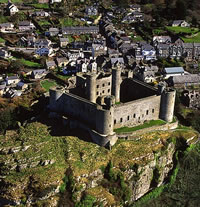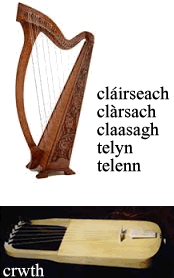
I spent yesterday in Harlech [ˈharlɛx] with a friend looking round the castle, exploring the village and wandering along the beach. We wondered where the name Harlech comes from, so I thought I’d find out. According to Wikipedia, there are two possible sources: from the Welsh ardd (high; hill) llech (stone) or from hardd (beautiful) llech (stone). Apparently it was referred to as ‘Harddlech’ up until the 19th century in some texts, so the second derivation might be more likely.
The word ardd is not used in modern Welsh – high is usually uchel and hill is bryn. There are cognates in the other Celtic languages: arth (hill) in Cornish; arz (high) in Breton; ard (head; ascent; incline; high; height; senior; advanced) in Irish; àrd (high, lofty, tall; great; loud; chief, eminent, superior, supreme) in Scottish Gaelic; and ard (high, towering, tall, big, loud, height, high place, fell, incline) in Manx.
These all come from from the Proto-Celtic *ardwos (high), from the Proto-Indo-European *h₁rh₃dh-wo- (high, steep), which is also the root of the Latin words arduus (lofty, high, steep, tall, elevated) and arbor (tree, mast, javelin), the Ancient Greek word ὀρθός (orthós – straight), the English word arduous, [source].
